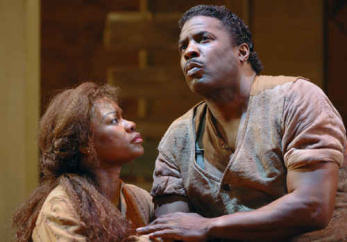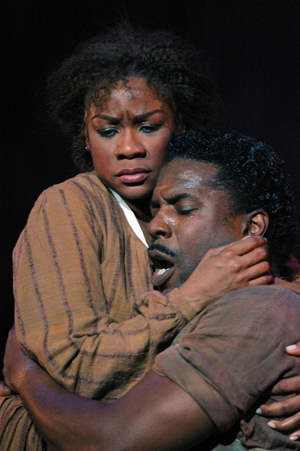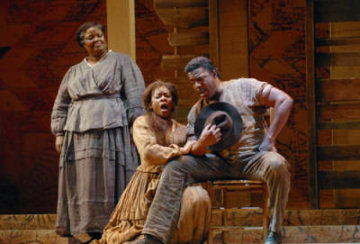|
Editor:
Marc Bridle
Webmaster: Len Mullenger
|
Seen and Heard International
Opera Review
Richard Danielpour: Margaret Garner (2004, East Coast premiere), Libretto by Toni Morrison, Soloists, Opera Company of Philadelphia Orchestra and Chorus, Stefan Lano, Conductor, Members of the Morgan State University Concert Choir, Dr. Eric Conway, Director, Academy of Music, Philadelphia, Pennsylvania, 12.2.2006 (BH)
Conductor: Stefan Lano Director: Kenny Leon Scenic Design: Marjorie Bradley Kellogg Costume Design: Paul Tazewell Lighting Design & Concept: Duane Schuler Wig & Make-up Design: Tom Watson Chorus Master: Elizabeth Braden Choreographer: Patdro Harris
Cast (in order of vocal appearance)
Margaret Garner: Denyce Graves Cilla, Robert’s mother: Angela Brown Robert Garner, Margaret’s husband: Gregg Baker Auctioneer: Roger Honeywell Edward Gaines, Owner of Maplewood Plantation: Rod Gilfry Casey, the Foreman of Maplewood Plantation: John Mac Master Caroline Gaines, Edward’s daughter: Kelly Kaduce George Hancock, Caroline’s fiancé: Chad Shelton Judge 1: Roger Honeywell Judge 2: Michael Mayes Judge 3: Michael Riley
“Bloody pillows…under my head…wishing, praying…I was dead.” -- Margaret Garner in Act I, Scene 1
With a stark libretto by Toni Morrison, inspired by the structural elements and emotional resonance of her 1988 book, Beloved, Richard Danielpour has created a powerful, tonal-with-no-apologies score. The result is a wrenching piece of theater – one that deserves to be heard well beyond its premiere engagements (Margaret Garner was co-commissioned with the Michigan Opera Theatre and the Cincinnati Opera), and that ideally could convince thousands who have dismissed opera to return and give the genre another chance. The Opera Company of Philadelphia can only be congratulated for mounting a major new piece, and for doing it the right way.
Beginning
in 1856, the story details the sad path of Margaret
Garner, a slave in the household of plantation owner
Edward Gaines, who owns her, protects her, admires
her singing – and at the conclusion of Act I,
he rapes her. In the second act, as Margaret’s husband
Robert arrives to lead her and their two children
to freedom, they are stopped by Gaines’ foreman Casey,
who calls her a “black slut” and is then strangled
by Robert, who is hunted down and killed by Gaines’
men. As Margaret and her two children witness his
murder, she makes a split-second decision to spare
them from similar misery and slits the throat of one
daughter, then stabs the other. In the trial that
ensues, she is charged with theft and destruction
of property (i.e., her children), and when the judge
asks, “And in what condition were the stolen goods
found?” the bailiff replies, “Unusable.” Margaret
is sentenced to be hanged, and as she quietly waits
on the scaffold with a noose around her neck, Gaines
rushes in with a note of clemency from the governor,
who has agreed to spare Margaret’s life and return
her to Gaines’ custody if she will confess to her
crimes. As she sings, “I live, oh yes, I live!”
she defiantly kicks the stool out from under her and
hangs herself.
Rod Gilfry sang well and made the most of a role that
could have been perilously one-dimensional, finding
sympathetic notes as well as noxious arrogance. Caroline
(his daughter, sung by Kelly Kaduce) and George (Chad
Shelton) were perhaps more flatly imagined as Gaines’
liberal daughter and her fiancé, who try to teach
her father a different way of living, but again, both
sang beautifully. Casting was excellent even in the
smallest roles, such as Roger Honeywell as a cheerful
slave auctioneer, and John Mac Master as the vindictive
foreman Casey.
The entire affair was conducted with sweep and drama by Stefan Lano, who made the most of the climaxes that Danielpour has sculpted so well, and got handsome playing from the company’s orchestra. The vibrant singing from the Opera Company’s choral contingent was augmented by students from the Morgan State University Concert Choir, all focused and well-prepared, and dramatically fiery in the opera’s big moments. And just to make the afternoon complete, the great Toni Morrison took the stage for curtain calls, along with Danielpour, Lano and the cast, to an overwhelming ovation.
Bruce Hodges
Photographs © Kelly and Massa Photography
Back to the Top Back to the Index Page |
| ||
|
||||





